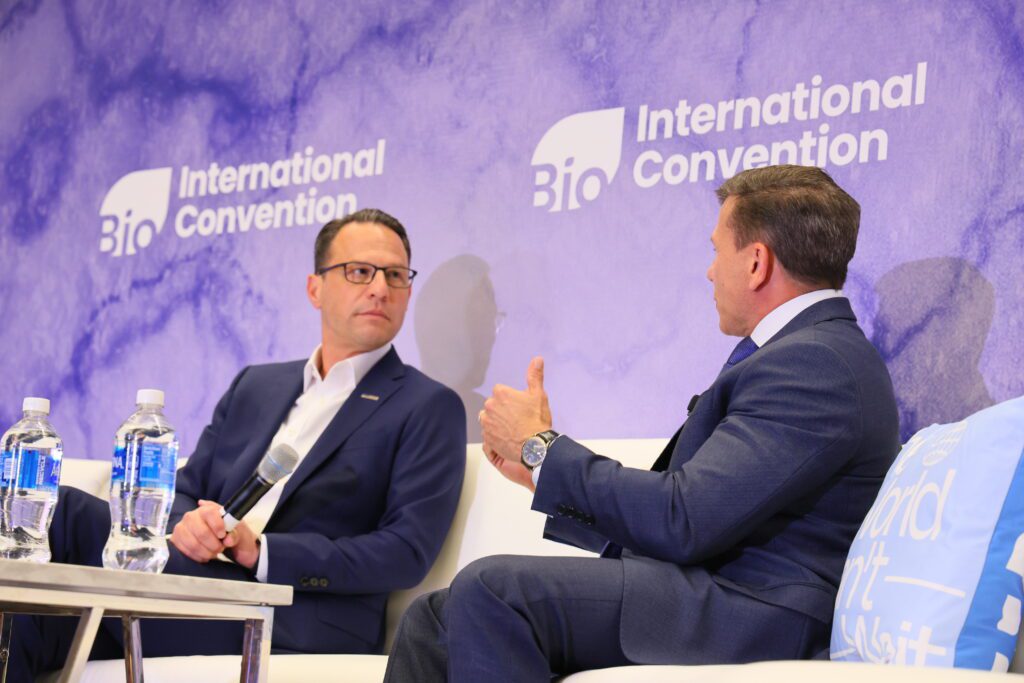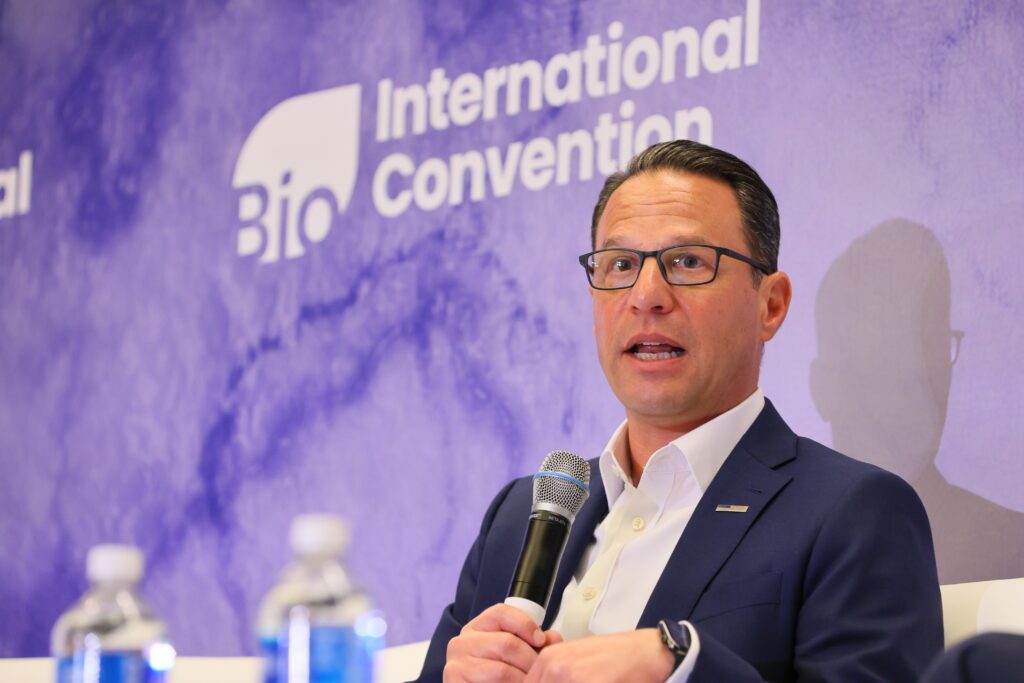Pennsylvania is open for biotech business and working hard to grow the life sciences ecosystem that already exists in the state, according to Gov. Josh Shapiro.
The governor made a pitch for his state during a wide-ranging fireside chat with Biotechnology Innovation Organization (BIO) President & CEO John F. Crowley on June 17 at the BIO International Convention in Boston.
Throughout his talk, the governor made it clear that his reason for speaking at the world’s largest biotech gathering was to encourage industry leaders to bring their businesses to Pennsylvania.
“We want your companies in our Commonwealth. When you think about the workforce that we have that goes along with all of the traditional economic development pieces, the great universities we have,” he said, “I think we have the absolute best of the best. We are a great place for you to do business, whether you’re a new startup or whether you’re a well-established larger pharmaceutical company.”
Bio.News interviews Pennsylvania Gov. Josh Shapiro at BIO 2025 in Boston
Why do business in Pennsylvania?
Gov. Shapiro spoke of the work his administration has done to attract business.
“When I got elected governor, one of the first things I did was to change the construct of how we do economic development. We have our traditional Department of Community & Economic Development, but we also created a new office, the Office of Transformation & Opportunity, led by Ben Kirshner, who is here with us today,” he said. “Ben’s job is to literally be a concierge, to take a CEO, take a company, from point A to point Z and deal with everything in between, from grants to tax policy to zoning and permits.”
On the subject of permits, Gov. Shapiro said his administration has been able to cut the time it takes to get a business permit from eight weeks to 24 hours.
“I would say to all of you out there who were thinking about doing business in Pennsylvania, and maybe we’re frustrated 10 years ago, it is a new day,” Gov. Shapiro said.
He also spoke about the state’s focus on life sciences, which he incorporated when his administration created Pennsylvania’s first economic development strategy in 20 years. “We decided to build an economic development strategy to focus just on five key areas, life sciences being chief among them,” Gov. Shapiro said.
The governor said the divided nature of his state’s legislature means that he cannot pass any legislation unless it receives bipartisan support. But that has not been a problem when it comes to attracting biotech.
“We have found that economic development in life sciences in particular is one of those areas where we’ve been able to foster bipartisan compromise and bipartisan consensus,” according to Gov. Shapiro.

Building on Pennsylvania’s advantages
Long before his election two and a half years ago, Pennsylvania was a leader in life sciences, Gov. Shapiro said.
“We are incredibly proud of the innovations that have come out of Pennsylvania. I’ll name two on each side of our state,” he said. “Jonas Salk invented the polio vaccine in Pittsburgh, and more recently, in the last 5-6 years, Drew Weissman and his team at the University of Pennsylvania saved millions of lives when they developed the mRNA vaccine that helped get people out of their homes during COVID.”
He boasted of the robust biotech ecosystem in Pennsylvania, where about 112,000 people are employed in the life sciences. Similar to North Carolina, Pennsylvania also has a “research triangle,” powered by universities like the University of Pennsylvania, Pitt, UPMC, and Penn State.
While Pennsylvania’s excellent universities and workforce have helped drive its success, the state’s biotech ecosystem still faces challenges, Gov. Shapiro said.
“We are in the top four in the entire country in Pennsylvania for the number of patents that come from life sciences,” he said. “But we only get 3% of the venture capital dollars to commercialize those great things that are coming out of our colleges and universities. So my task is to figure out how to connect the dots, how to have more commercial wins, and how to help these companies that are struggling to find capital.”
In his latest budget plan, Gov. Shapiro is pushing to have Pennsylvania provide some of the capital that biotechs need through a new life sciences innovation fund.
Another way the governor is seeking to boost the ecosystem is by supporting “a clinical trial network of all of our leading research universities,” to provide easier access to the state’s clinical marketplace for those seeking to hold a clinical trial.

BIO President & CEO John F. Crowley (right) interviews Pennsylvania Gov. Josh Shapiro
A biotech believer
Gov. Shapiro’s father is a pediatrician, and he said his initial career ambition was to become a doctor himself because he wanted to help people. He chose public service as a different means of helping others, but maintained an interest in medicine.
“I have a particular passion for that space, and so it’s very natural for me, once I got elected governor, to make sure that life sciences and medicine and healthcare” were supported in Pennsylvania, he said.
Noting that 75% of the vaccines administered in the U.S. are manufactured in his state by GSK, the governor criticized anti-vaccine sentiment and extolled the virtues of immunization.
“I believe in science, and I believe the incredible work that you all do to develop these vaccines and put them in a position where they can save lives,” Gov. Shapiro said.




